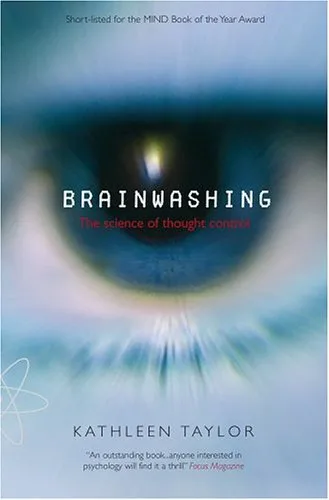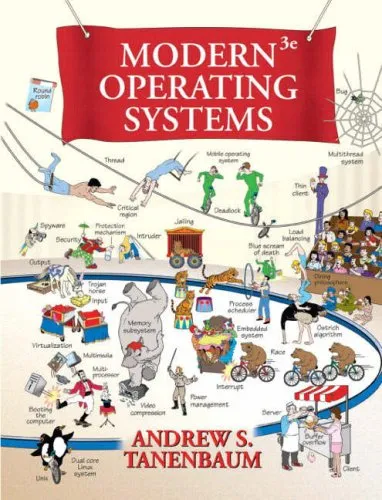Brainwashing: the science of thought control
4.9
بر اساس نظر کاربران

شما میتونید سوالاتتون در باره کتاب رو از هوش مصنوعیش بعد از ورود بپرسید
هر دانلود یا پرسش از هوش مصنوعی 2 امتیاز لازم دارد، برای بدست آوردن امتیاز رایگان، به صفحه ی راهنمای امتیازات سر بزنید و یک سری کار ارزشمند انجام بدینکتاب های مرتبط:
مقدمهای بر کتاب "Brainwashing: The Science of Thought Control"
کتاب "Brainwashing: The Science of Thought Control" اثر کتلین تیلور، یک بررسی دقیق علمی پیرامون مفهوم Brainwashing و تأثیرات عمیق آن بر فکر و ذهن انسان است. تیلور در این کتاب به شدت مشکلات ناشی از کنترل ذهن و تفکر را تحلیل میکند و به بررسی علمی پدیدههایی میپردازد که منجر به تغییر باورها و رفتارهای انسانها میشود.
خلاصهای جامع از کتاب
"Brainwashing: The Science of Thought Control" به عمق مفهوم Brainwashing وارد شده و آن را نهتنها به عنوان یک پدیده سیاسی و اجتماعی بلکه به عنوان یک فرآیند روانشناختی و عصبیشناختی مورد بررسی قرار میدهد. کتلین تیلور به بررسی این میپردازد که چرا و چگونه برخی افراد یا گروهها قادر هستند بر دیگران تأثیرگذار باشند و آنها را به پذیرش عقایدی سوق دهند که معمولاً با منطق و تفکر انتقادی آنها همخوانی ندارد. او توضیح میدهد که چه مکانیزمهایی در مغز فعال میشود تا انسانها به راحتی تحت تأثیر قرار بگیرند و چگونه میتوان مقاومت در برابر این فرآیندها را تقویت کرد.
نکات کلیدی کتاب
- بررسی علمی و روانشناختی فرآیند Brainwashing.
- نقش رسانهها و تبلیغات در کنترل ذهن عمومی.
- استراتژیها و تکنیکهای مقاومت در برابر تغییرات اجباری فکری.
- تأثیرات اخلاقی و اجتماعی Brainwashing بر جوامع انسانی.
نقلقولهای مشهور از کتاب
"کنترل ذهن، زمانی بیشترین قدرت خود را دارد که افراد خود از دستدادن آزادی فکریشان بیخبر باشند."
"در جهانی که همه چیز به سرعت تغییر میکند، تنها حفاظت واقعی در برابر Brainwashing، آگاهی و تفکر انتقادی است."
چرا این کتاب مهم است
"Brainwashing: The Science of Thought Control" از اهمیت فوقالعادهای برخوردار است زیرا به ما کمک میکند تا آگاهانهتر و مقاومتر در برابر روشها و استراتژیهایی که برای تغییر افکار و رفتارها به کار میروند، عمل کنیم. در دنیای امروز که به سرعت رسانهها و تکنولوژیهای ارتباطی پیشرفت میکنند، اهمیت این کتاب بیشتر نیز شدهاست زیرا بسیاری از افراد و سازمانها به دنبال بهرهبرداری از این تکنیکها برای منافع شخصی و گروهی خود هستند. این کتاب به خوانندگان نشان میدهد که چگونه میتوان با تفکر نقادانه و آگاهیهای علمی، موانع فکری و اجتماعی را شکست و کنترل ذهن خود را حفظ کرد.
Introduction to "Brainwashing: The Science of Thought Control"
Welcome to an intriguing exploration of the human mind and how it can be manipulated. "Brainwashing: The Science of Thought Control" by Kathleen Taylor delves into the mechanisms through which beliefs, behaviors, and perceptions can be radically altered. The book marries insights from neuroscience, psychology, and history to unravel the complex notion of mind control, offering readers a profound understanding of what makes us susceptible to it and how we can guard ourselves against it.
Detailed Summary
This riveting work begins by tracing the origins of brainwashing — a term first popularized in the Cold War era, when fear of ideological conversion was rampant. Kathleen Taylor, a distinguished neuroscientist, provides a comprehensive analysis of how brainwashing has been understood over the years, from its crude characterization as a tool of oppressive regimes to a more nuanced understanding based on modern science. She explains how such manipulations occur using a blend of authoritarian techniques and psychological vulnerabilities found in every human being.
Through meticulously researched case studies, Taylor covers various historical instances of brainwashing, including cult indoctrination, propaganda in totalitarian states, and even the subtle influences of advertising and social media today. The book offers a scientific perspective on how our brains process information and how this process can be hijacked to implant new beliefs, often resulting in the complete transformation of an individual's identity and worldview.
At its core, the book argues that brainwashing is not just an exotic or horror-filled myth but a fundamental part of our cognitive susceptibilities. By understanding the science behind it, we can become more aware of its presence in less obvious forms, such as cultural and social pressures that shape our daily decisions and beliefs.
Key Takeaways
- The human brain's natural tendencies towards conformity, obedience, and social learning make it inherently susceptible to manipulation.
- Understanding the psychological and neuroscientific foundations of thought control can empower individuals to better resist malign influences.
- Taylor provides a robust framework for distinguishing harmful brainwashing techniques from everyday socialization and influence.
- The digital age has introduced new avenues for thought control, making the knowledge in this book more relevant than ever.
Famous Quotes from the Book
“Brainwashing is not an exotic phenomenon, confined to the realm of fiction and historical accounts. It is a reality — albeit one tinged more often than not with grey rather than black or white hues.”
“The key to resisting brainwashing is understanding the mechanisms through which it operates, and fostering self-awareness of our inherent cognitive biases.”
Why This Book Matters
In today's world, where information is abundant yet often conflicting, the insights offered in "Brainwashing: The Science of Thought Control" are vital. This book equips readers with the knowledge to critically evaluate the sources and intentions behind the information we are bombarded with daily. As technology advances and social media platforms proliferate, the capacity for subtle and pervasive forms of brainwashing grows. Empowered with the understanding Kimberly Taylor bestows, individuals can better safeguard their mental autonomy and promote freedom of thought in their communities.
Ultimately, Taylor's work serves as a call to action — urging us to acknowledge the power of brainwashing and to nurture a more informed, resilient global society capable of withstanding the pressures of manipulative influences.
دانلود رایگان مستقیم
شما میتونید سوالاتتون در باره کتاب رو از هوش مصنوعیش بعد از ورود بپرسید
دسترسی به کتابها از طریق پلتفرمهای قانونی و کتابخانههای عمومی نه تنها از حقوق نویسندگان و ناشران حمایت میکند، بلکه به پایداری فرهنگ کتابخوانی نیز کمک میرساند. پیش از دانلود، لحظهای به بررسی این گزینهها فکر کنید.
این کتاب رو در پلتفرم های دیگه ببینید
WorldCat به شما کمک میکنه تا کتاب ها رو در کتابخانه های سراسر دنیا پیدا کنید
امتیازها، نظرات تخصصی و صحبت ها درباره کتاب را در Goodreads ببینید
کتابهای کمیاب یا دست دوم را در AbeBooks پیدا کنید و بخرید
1743
بازدید4.9
امتیاز0
نظر98%
رضایتنظرات:
4.9
بر اساس 0 نظر کاربران
Questions & Answers
Ask questions about this book or help others by answering
No questions yet. Be the first to ask!
















